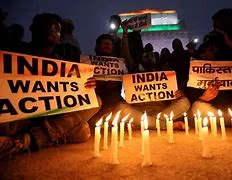Kashmir Terror Attack: Global Outrage, Modi Govt’s Emergency Moves & India’s Next Steps Against Pakistan
In an event that has once again shaken India's soul, a brutal terror attack in Kashmir has left the nation mourning and the world watching with deep concern.
The tragedy not only claimed innocent lives but also reignited the long-standing tensions between India and Pakistan.
The Narendra Modi government has moved swiftly, invoking emergency measures and recalibrating its diplomatic and military strategies.
Globally, leaders have expressed solidarity with India, condemning the violence and calling for firm action against terrorism.
But where does India go from here?
Let’s delve deeper into the aftermath, the government's response, international reactions, and the path ahead for India.
The Attack: What Happened?
The attack occurred near Pulwama, a region that has seen multiple violent incidents over the years.
A convoy of security forces was targeted with explosive-laden vehicles, resulting in a devastating loss of life and injuries.
Key facts:
-
Date: April 2025
-
Location: Pulwama District, Jammu & Kashmir
-
Fatalities: 38 security personnel
-
Perpetrators: Terror group suspected to be backed by Pakistan-based handlers
The sheer scale and precision of the attack have raised serious questions about the cross-border support and radicalization pipelines that continue to fuel violence in Kashmir.
Modi Government’s Emergency Measures
Immediately after the attack, Prime Minister Narendra Modi chaired a high-level emergency meeting with:
-
The National Security Advisor (NSA)
-
Chief of Defence Staff (CDS)
-
Home Minister
-
Top intelligence officials
The following measures were swiftly put into motion:
1. Diplomatic Offensive Against Pakistan
-
India recalled its High Commissioner from Islamabad.
-
A global diplomatic campaign began to isolate Pakistan, similar to the post-Pulwama 2019 strategy.
-
New dossiers highlighting Pakistan’s terror links were shared with the United Nations, FATF (Financial Action Task Force), and key global powers.
Read: How India's Diplomacy Is Fighting Terrorism ➝
2. Security Reinforcements in Kashmir
-
Deployment of additional paramilitary forces in sensitive areas.
-
Suspension of internet services to curb misinformation.
-
Heightened patrolling and surveillance, especially along the Line of Control (LoC).
Related: India's Counter-Terror Strategies in Kashmir ➝
3. Economic Measures
-
Talks about revisiting the Most Favored Nation (MFN) trade status with Pakistan were revived.
-
Economic sanctions and a review of river water-sharing agreements were hinted at.
4. Military Options on the Table
While official statements emphasized a "measured and appropriate" response, sources indicated that covert options, precision airstrikes, and cyber warfare strategies are being actively explored.
The government also gave the armed forces full operational freedom to respond to any provocations at the border.
Global Reaction: Support for India
The attack drew swift condemnation from the international community:
-
United States: Strongly condemned the attack, calling it a "heinous act of terrorism."
-
European Union: Expressed solidarity with India and called for Pakistan to crack down on terror groups operating within its territory.
-
United Nations: Secretary-General issued a statement urging all parties to exercise restraint but emphasizing the need to end terrorism.
Countries like France, Australia, Japan, and the UK joined the chorus of support for India.
Explore: How Global Leaders Are Supporting India's Anti-Terror Fight ➝
Pakistan’s Response: Denial and Defensiveness
As expected, Pakistan rejected any involvement in the attack, calling it an "Indian conspiracy to malign Pakistan."
However, India's presentation of evidence — including intercepted communications and recovered weaponry — is putting Islamabad under renewed international pressure.
Notably, FATF is set to review Pakistan’s compliance with anti-terror financing measures soon, and this attack could significantly impact the outcome.
Impact on Common Citizens
Beyond the corridors of power, the human cost of this tragedy is immense:
-
Families of the martyred soldiers are demanding justice and decisive action.
-
Fear has resurfaced among civilians in Kashmir, affecting daily life and economic activities.
-
Sentiments of nationalism and unity are running high across the country.
Learn: How Terror Attacks Affect Local Communities in Kashmir ➝
India's Possible Next Steps
Given the complex nature of India-Pakistan relations and the delicate regional stability, India's strategy will likely include a combination of:
1. Covert Operations
Targeted, deniable operations to eliminate terror infrastructure across the border without triggering full-scale conflict.
2. Surgical Airstrikes
Precision strikes on identified terror camps, similar to the 2019 Balakot airstrikes.
3. Cyber Retaliation
Use of cyber warfare to disrupt terrorist networks, communication, and financial channels.
4. Economic Isolation
Continued push to pressure Pakistan economically by influencing international lending agencies and investment flows.
Related: How India Uses Economic Tools Against Terror ➝
Strategic Challenges Ahead
While swift action is needed, the government must also tread carefully:
-
Avoiding escalation into a full-scale war.
-
Managing diplomatic relations with key players like China, Russia, and the US.
-
Maintaining internal communal harmony amid high public emotions.
Conclusion: A Nation United in Grief and Resolve
The Kashmir terror attack is a grim reminder of the unfinished fight against terrorism.
But it is also a powerful testament to India’s resilience, unity, and determination.
As India mourns its brave soldiers, it also stands at a crossroads — determined to seek justice, secure its borders, and work towards a future where such tragedies become relics of the past.
The world is watching. India is ready.

Comments
Post a Comment